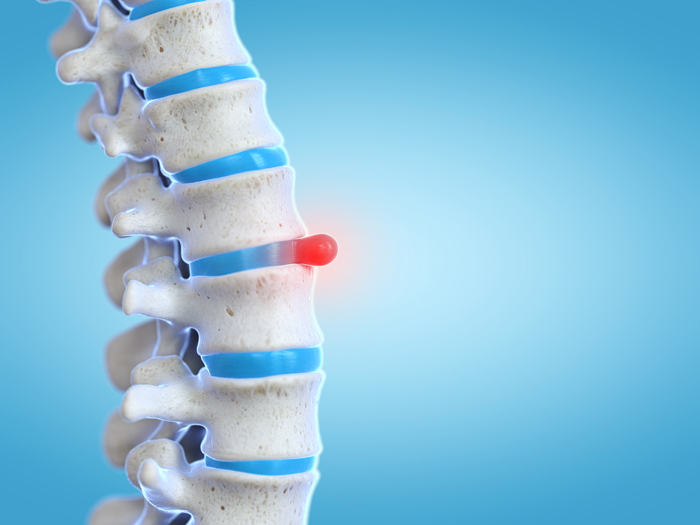Slipped Disc Treatment & Diagnostics in Chunni Ganj, Kanpur
Slipped Disc
A herniated disc, popularly known as a slipped disc or vertebral disc prolapse, can happen in any part of the spinal cord and disturb the nerves around it. This condition causes the symptoms of weakness and numbness to come up.
What is the meaning of a slipped disc?
There exists a rubber-like cushion-like structure between each vertebra in the spine called the discs. These discs have a jelly-like soft nucleus or center. The exterior part is called the annulus, which is tough and rubbery. A slipped disc or vertebral disc prolapse occurs when the liquid nucleus pushes itself out in the annulus because of the presence of a tear.

What are the Symptoms of Slipped Disc?
Usually, a slipped disc affects one side of the body. A slipped disc can occur in the neck, although it is more common in the lower parts of the body. Some of the symptoms are:
- If the vertebral disc prolapse occurs in your lower back, you will feel pain in your thighs, calf muscles, and buttocks. You will experience pain in some parts of the legs too. If the slipped disc occurs near your neck, you will feel the sharp burning pain near your shoulders and arms.
- Numbness in the area of pain and the surroundings affected by the slipped disc.
- Muscles affected by the slipped disc can get weak. This condition can make you stumble or make you face issues while holding or lifting anything.
When to see a doctor for a slipped disc?
You need to see a doctor for slipped disc if:
- You experience neck or back pain that is persistent and extends to your arms or legs.
- If you experience numbness in a particular part of the body
- If you feel very weak along and pain throughout the body
Request an appointment at Apollo Spectra Hospitals, Kanpur
Call 1860-500-2244 to book an appointment
What are the causes of a slipped disc?
- As you age, the disc starts degenerating due to wear and tear. With age, the disc loses its flexibility and can twist, rupture, tear, or get strained.
- Lifting heavy objects by putting a lot of pressure on your back instead of balancing it out with your thigh and leg muscles.
- Accident: If there is an injury in the back, a slipped disc can occur.
What are the risks linked to slipped discs?
- Obesity or excessive body weight can put a lot of pressure on the discs, increasing the chances of getting a vertebral disc prolapse.
- If your occupation involves strenuous physical activities like lifting, pulling, pushing, bending, you are more prone to a slipped disc.
- Sometimes, genetics play a role in deciding whether you will get a slipped disc.
- If you are a smoker, there are risks of having slipped discs. Smoking reduces the oxygen supply to the discs, aiding the process of wear and tear.
What are the complications associated with the slipped disc?
- In rare cases, due to weakness and numbness, the patient can get paralyzed.
- The pain, numbness, and other symptoms can reach their peak and extreme points. This condition will be an obstacle when you do your daily chores.
- A slipped disc can lead to a dysfunctional bowel and urinary incontinence. This condition can occur if the disc compresses the nerves of the spinal canal.
- The numbness can also lead to loss of sensation near the saddle, in the inner thighs, rectum, and back of the legs.
What are the precautions to avoid slipped discs?
- Exercising helps a lot to keep the risks of a slipped disc at bay. It increases flexibility and mobility, helps to strengthen the trunk muscles, and also stabilizes the muscles.
- Maintaining a good posture while sitting and working in front of the laptop for long hours is crucial to avoid slipped discs.
- Lifting heavy objects carefully by putting pressure on the legs rather than on the back.
- Maintain a healthy weight. Try to cut down on the excess fat as these can put extra pressure on the spine and discs.
- Avoid smoking or try to quit it.
Conclusion
At Apollo Spectra, Kanpur, the doctor will initially try to help you relieve the pain with conventional methods of medications and massages. If it doesn't work, the doctor will recommend you to go for surgery. Remember, your doctor will be your best guide when it comes to preventing or treating slipped discs.
You can sit upright or try to do it. Then, rest your back and the back of the chair. Try sitting upright most of the time. Take breaks and do some stretching.
Mild exercises like yoga and aerobics like brisk walking can help a lot. Your doctor can guide you regarding which exercises you should do.
Yes, slip discs can be cured permanently. Conventional methods, massages, and exercise help with slipped discs within a minimum of 8 weeks. With the help of a chiropractor, the time will get a bit shorter. And with surgery, there is a permanent solution for a slipped disc.
Our Top Specialities
NOTICE BOARD
CONTACT US
CONTACT US
 Book Appointment
Book Appointment


.svg)
.svg)
.svg)
.svg)








